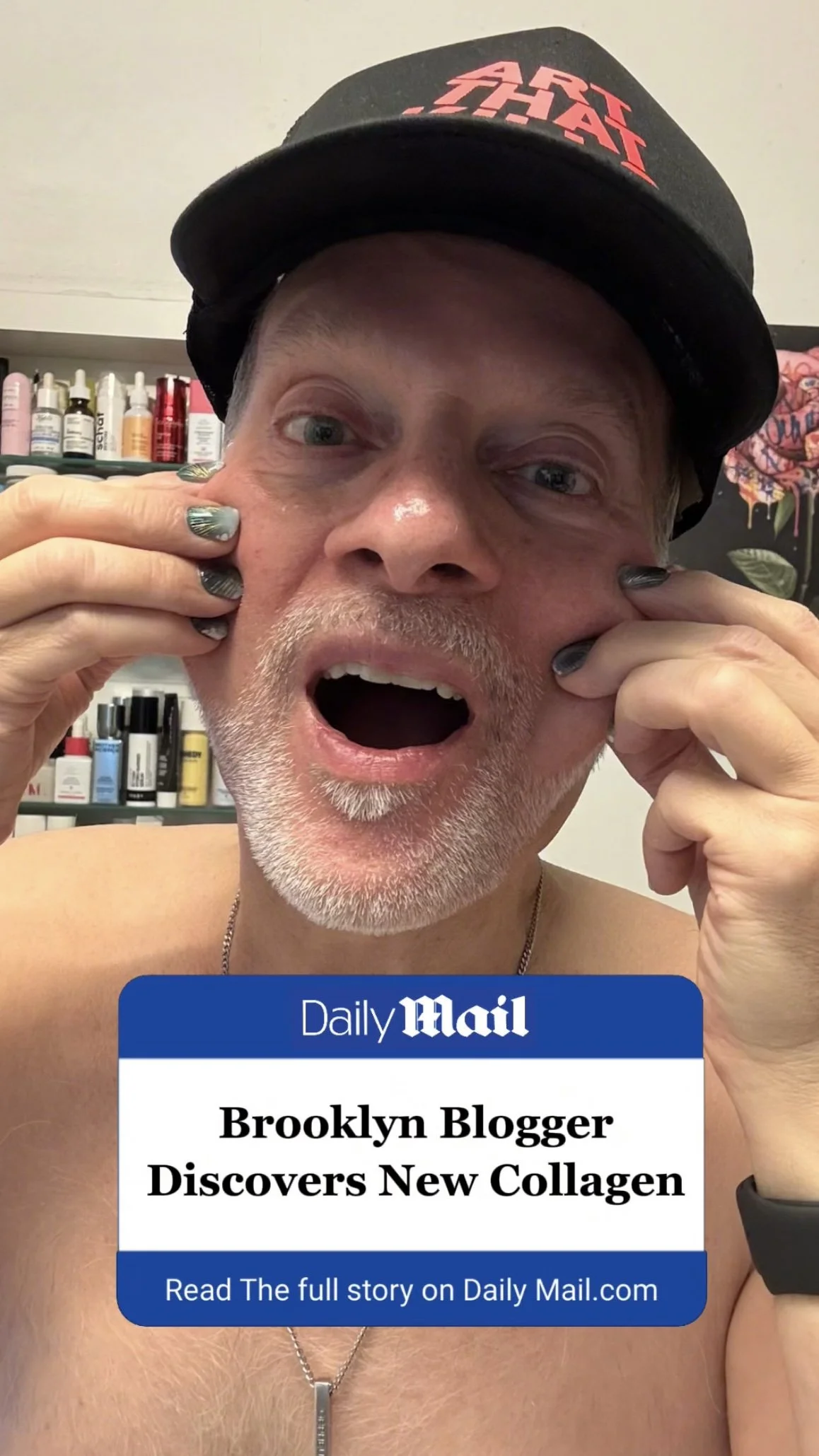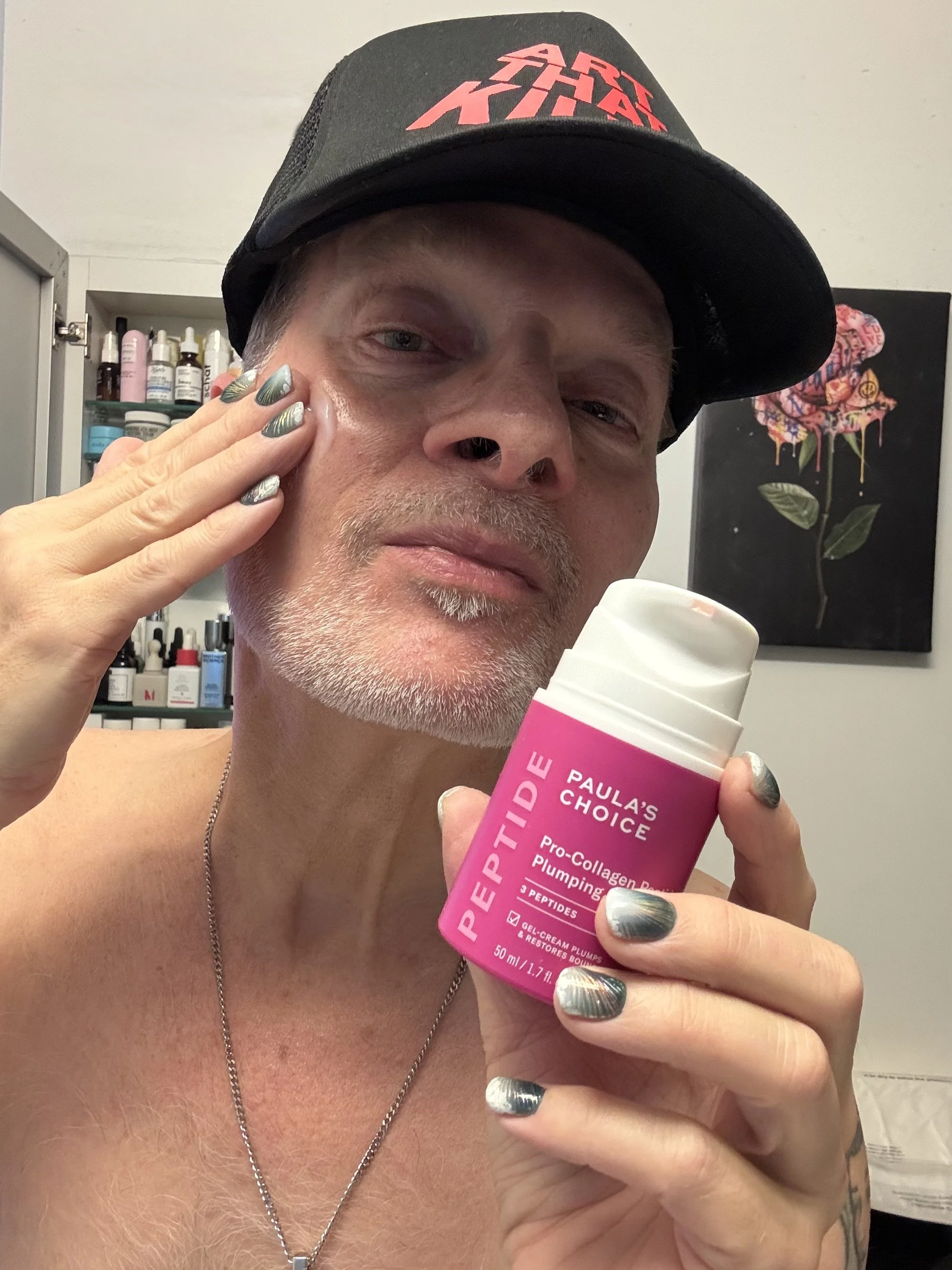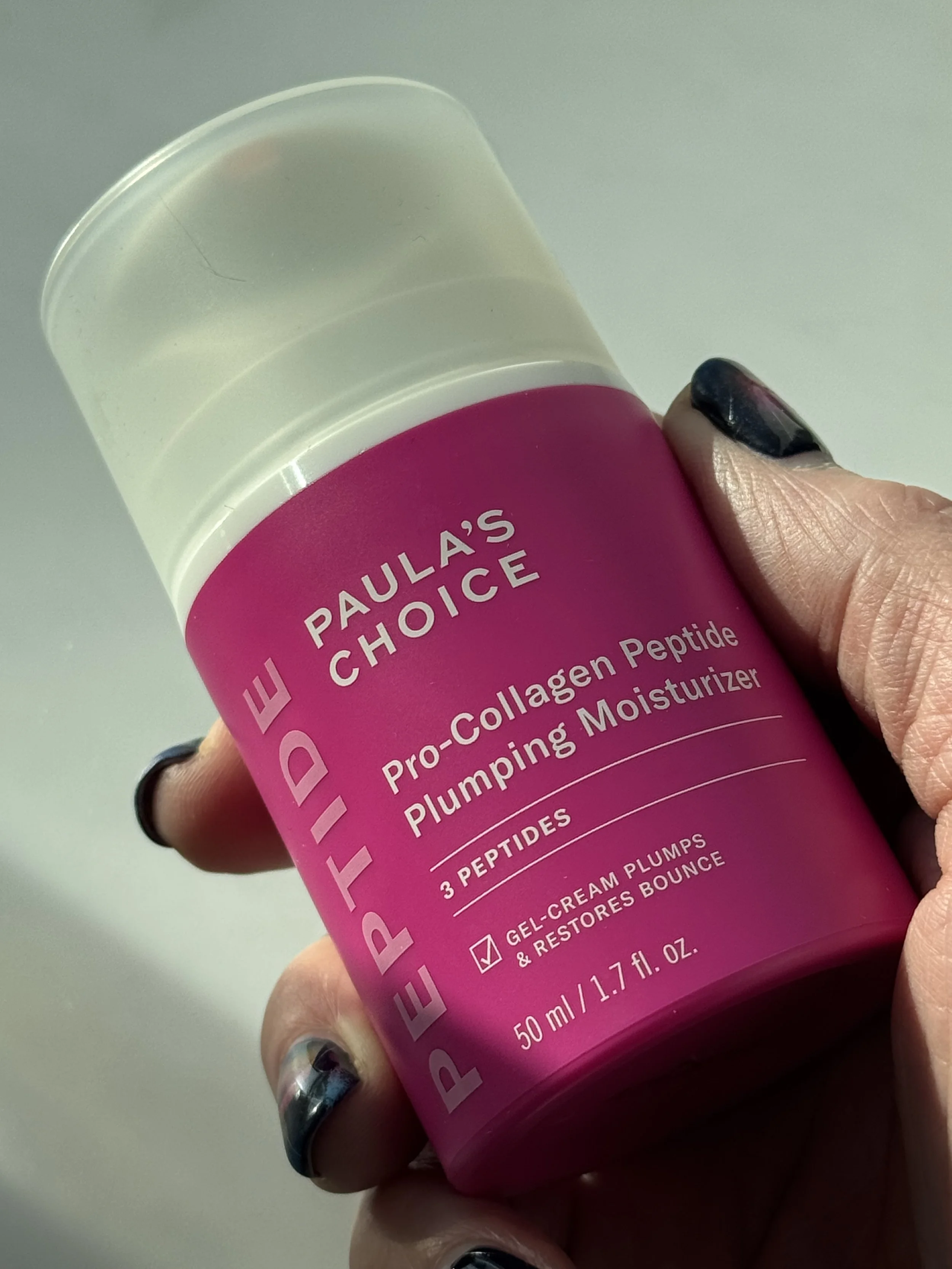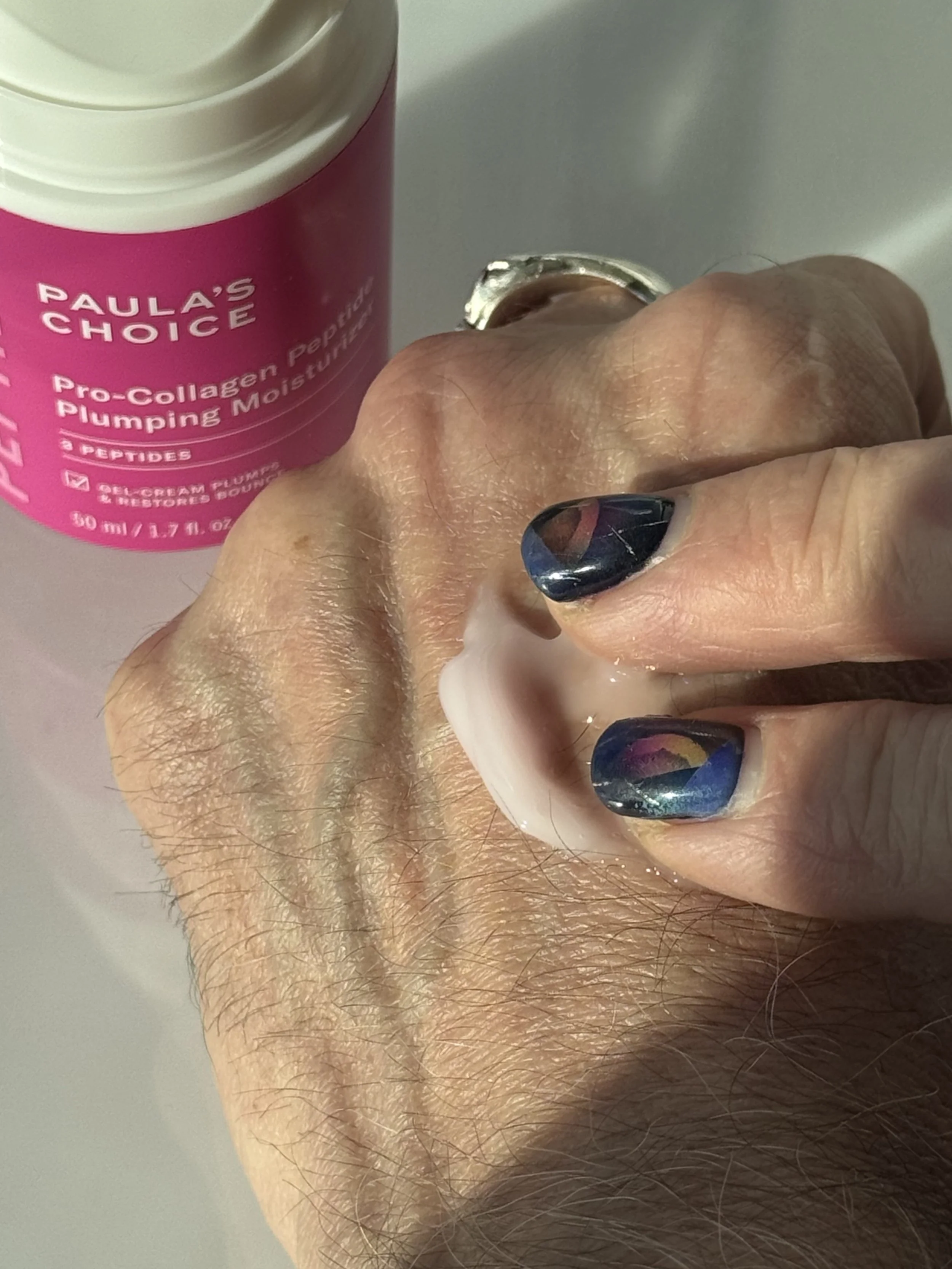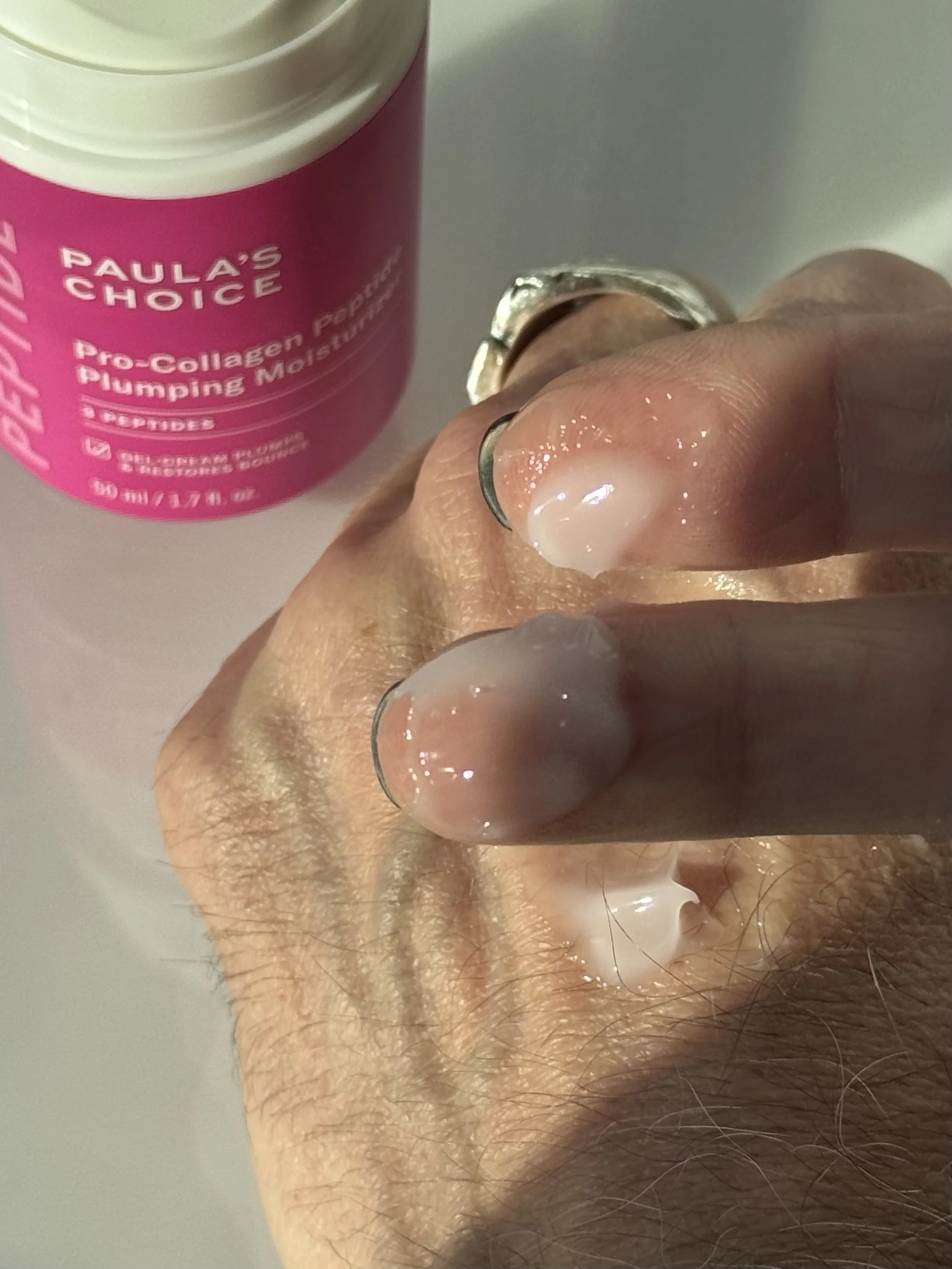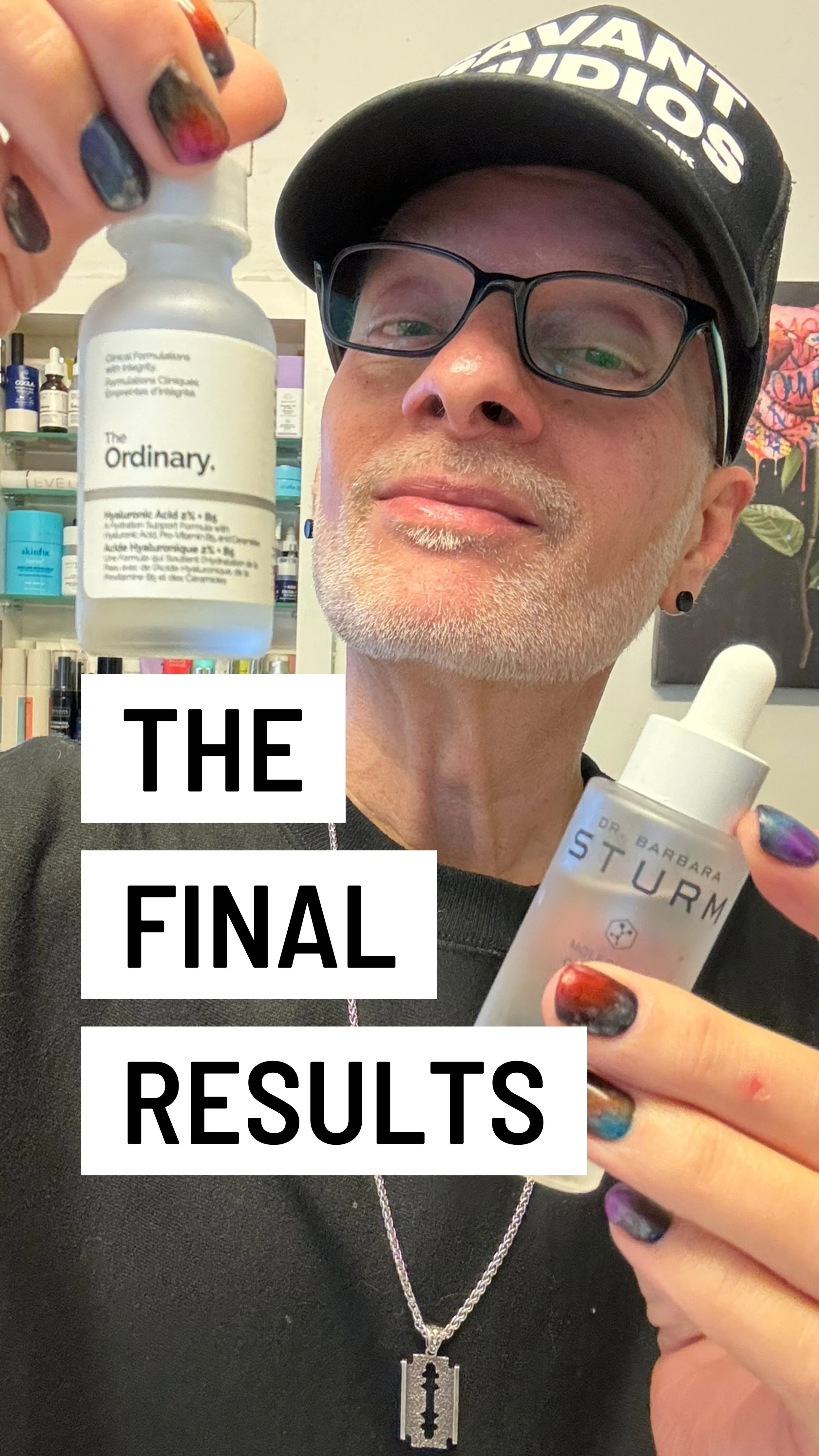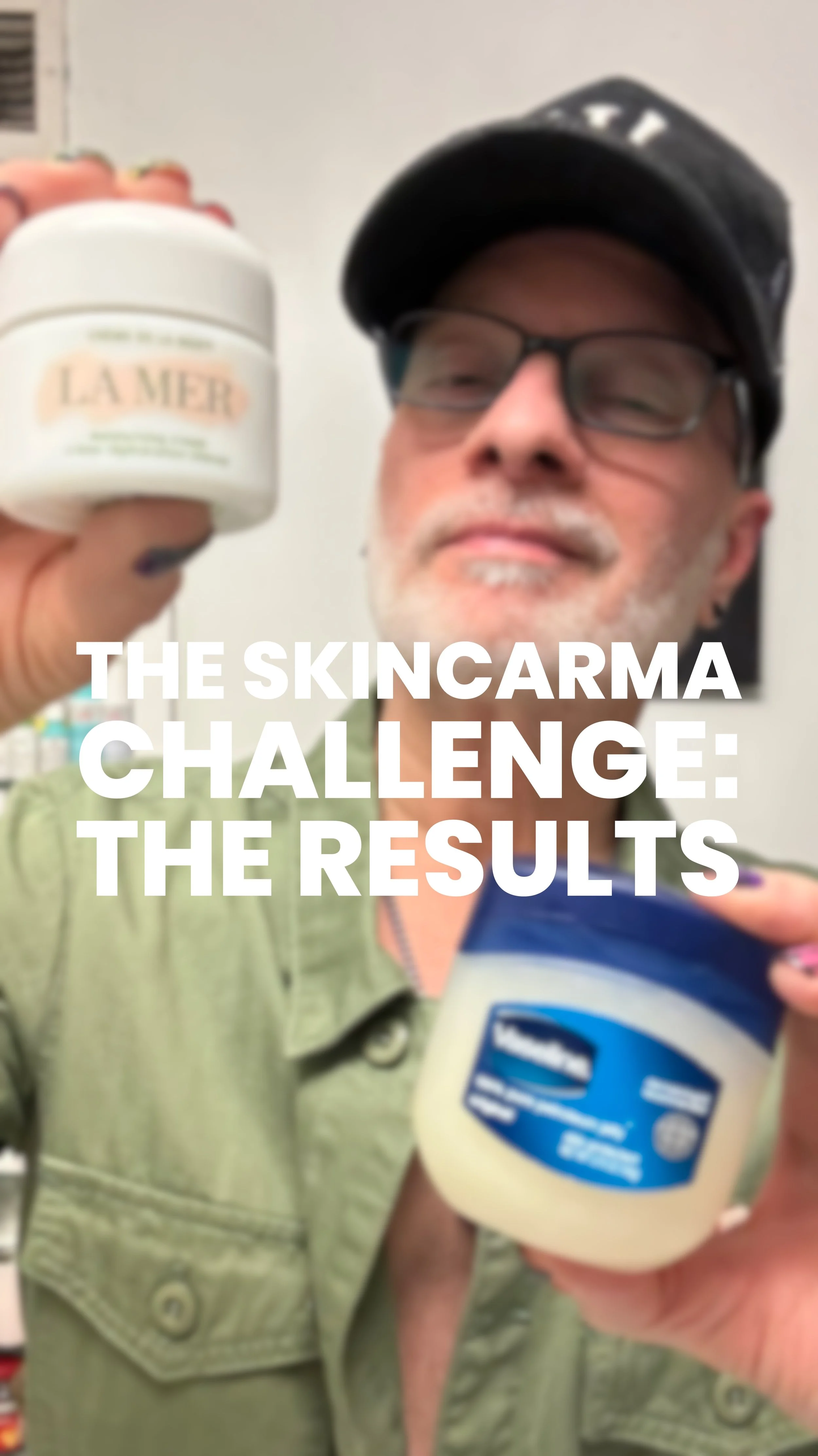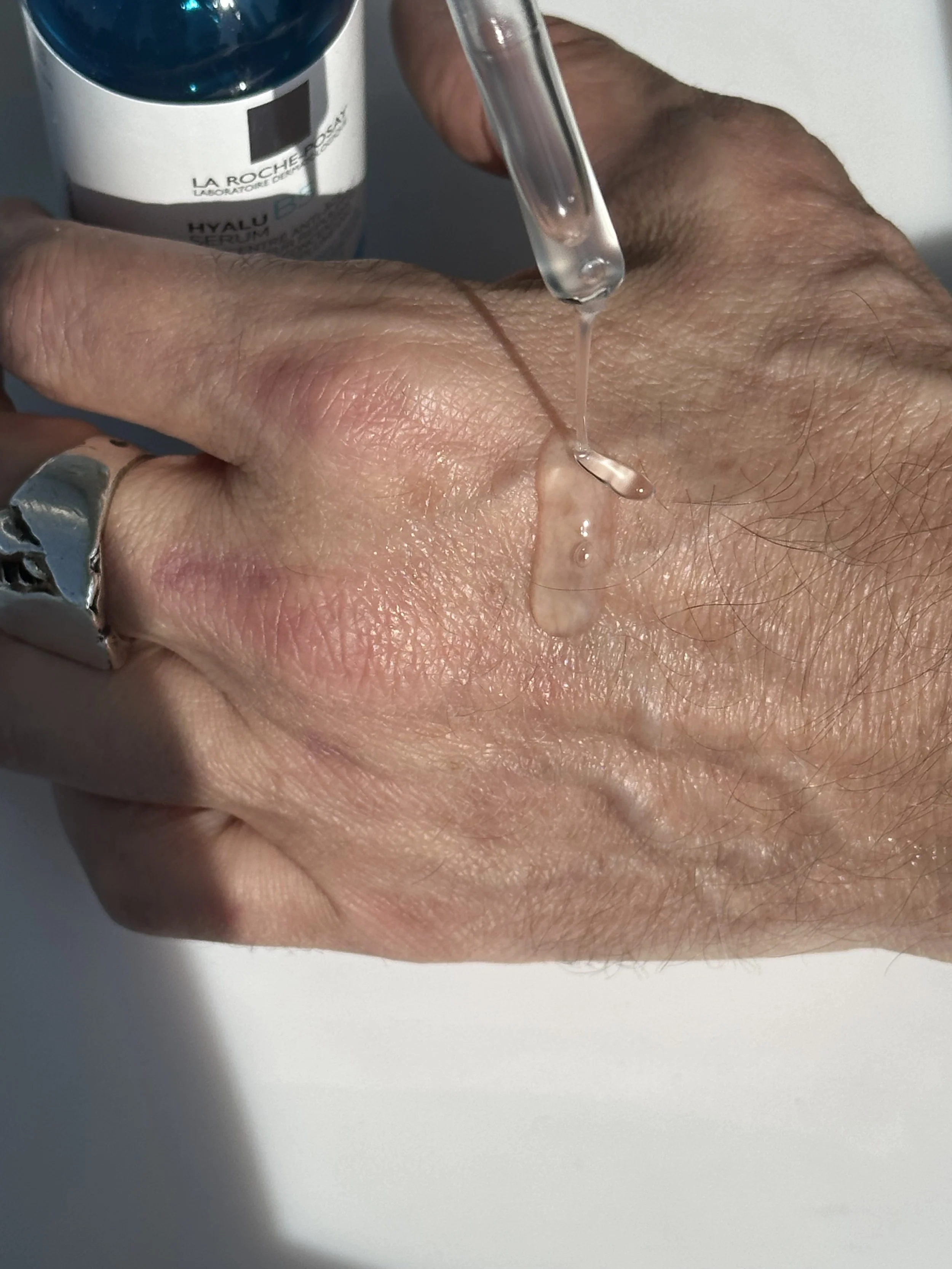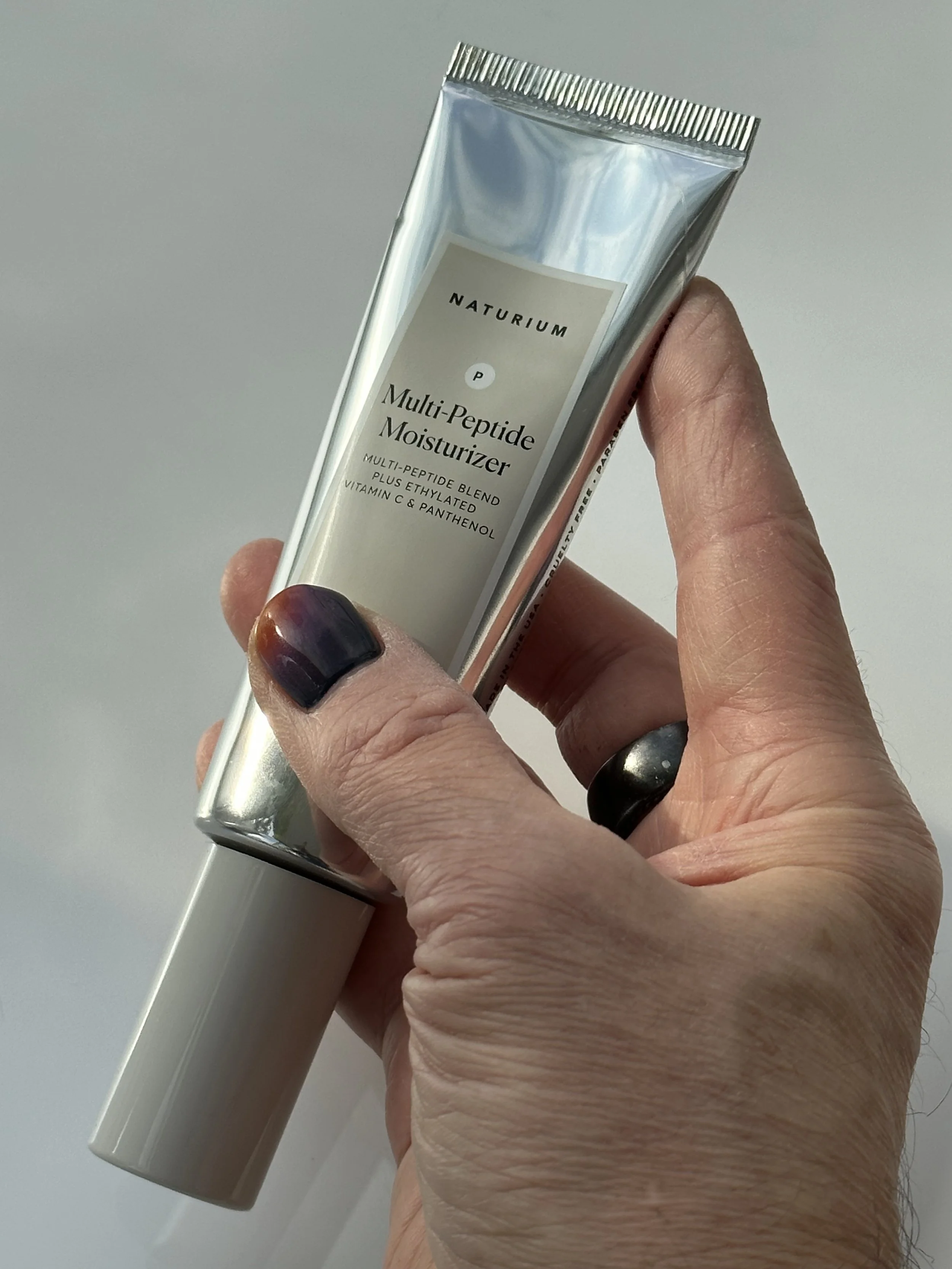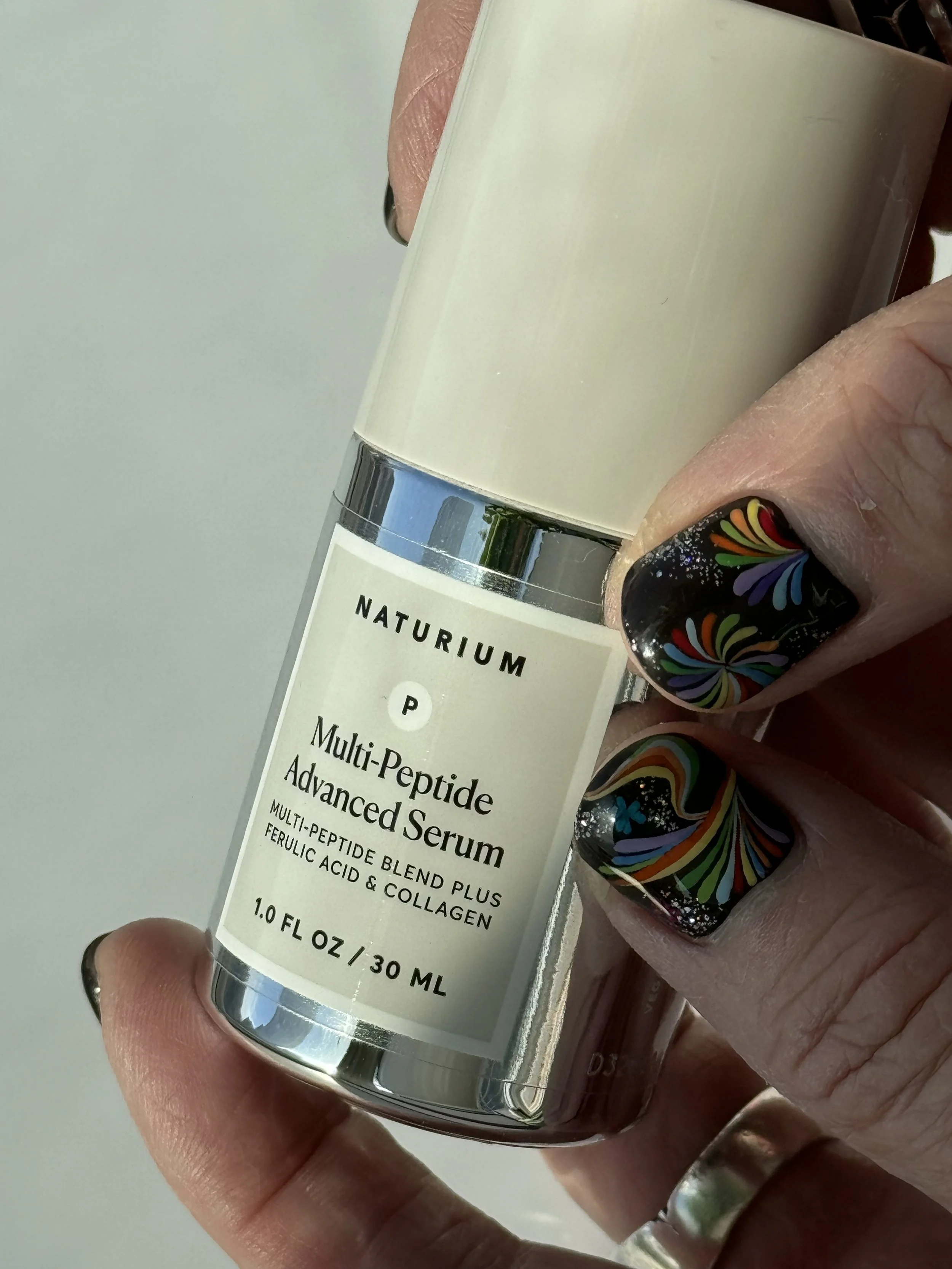WHAT ARE PEPTIDES? WHY THEY'RE KEY TO YOUR SKIN'S YOUTHFUL BOUNCE - What do peptides do for skin? What causes collagen loss? What not to mix with peptides?
Plus, Paula’s Choice Pro-Collagen Peptide Plumping Moisturizer Product Review
I was recently invited to appear on the Radiance Revealed podcast hosted by board-certified dermatologist Dr. Jen Haley. The topic: the Five Hottest Ingredients in 2025.
I was so amped up. After all, I have unique insights into the latest skincare science and ingredient technologies featured in new product launches.
Sure, I’m a skincare copywriter, blogger and podcaster with more than two decades of experience in beauty. But I’m also a product innovation judge in the annual Beauty Matter NEXT awards.
Over the past several months, I’ve come across at least a dozen new growth factor serums and some very intriguing products featuring exosomes – a skin renewal technology that dermatologists like Dr. Jen have employed in their practices for years. Psst…I’ll be sharing what I’ve learned about exosomes on the blog and in my podcast in the weeks ahead.
While growth factors and exosomes are certainly intriguing – with a tinge of alien technology about them – one seemingly mundane ingredient powerhouse seems to be driving the hottest trend of all: peptides.
I know what you’re likely thinking: Peptides? Haven’t peptides been around for years?
Well, yes, they have. But the science of peptides is dynamic. New peptide technologies are entering the skincare marketplace almost monthly.
What are peptides?
Well, peptides are short chains of amino acids that function as the building blocks of proteins in the skin, including collagen, elastin and keratin. They’re the foundations of your skin, responsible for its overall texture, strength and resilience – as well as skin barrier integrity. Without these essential substances, your skin is less firm, wrinkles are more pronounced, dehydration accelerates. Skin loses its youthful ‘bounce’.
BEST PAULA’S CHOICE PRODUCTS
Peptides seem to be making their way into new product innovations more than any other ingredient. Especially collagen-boosting peptides.
Collagen is the driving force behind the sudden pervasiveness of peptides. Why collagen? Well, because collagen is essential to youthful looking skin! The most abundant protein in your body, collagen is a key component in skin that keeps it looking and feeling plump.
Regrettably, it degrades over time and collagen levels nosedive.
Collagen decline begins in your 20s, with a loss of between 1-1.5% per year. By age 50, the average person has experienced a 25-30% decline in collagen levels. Collagen loss is no laughing matter. Significantly less collagen means noticeably sagging skin and more prominent lines and wrinkles on the surface.
The trick is, there are only two ways to counter collagen loss: stimulate collagen production and prevent loss in the first place.
THE SECRET IS OUT!
Yet, as recently as 2023, skincare marketers were attempting to fool consumers into believing they could just apply serums or face creams with collagen to counteract collagen loss. It was complete nonsense and most of those silly products disappeared as consumers boned up on the physiology of the skin.
The truth: Collagen molecules are too large to penetrate the skin barrier. Intact collagen cannot cross into the skin barrier due to its large molecular size and triple-helix structure. Collagen remains on the skin’s surface, acting as a humectant; it cannot replenish dermal collagen – the substance that gives skin its youthful plumpness.
So how do you enhance collagen production to reverse that steady decline? Retinoids like Retinol and Retinaldehyde are one way. Highly concentrated topical Vitamin C serums can help boost collagen levels, too, by both stimulating production and preventing degradation. And, of course, sunscreen is essential for defending against collagen degradation – and other signs of photodamage.
Collagen-boosting peptides are an increasingly popular means of countering loss and maintaining your skin’s youthful qualities.
Before I get to my detailed Paula’s Choice Pro-Collagen Peptide Plumping Moisturizer product review just below, I wanted to explore some of the most frequently asked questions about peptides, collagen, and the technology behind the new Paula’s Choice collagen peptide cream.
1. What are peptides?
Peptides are short chains of amino acids that act as building blocks of proteins such as collagen, elastin and keratin. These proteins are the foundations of your skin and are responsible for its texture, strength, resilience – and even skin barrier integrity.
Peptide chains typically comprise from 2-50 amino acids while proteins themselves are defined as being composed of more than 50 amino acid molecules.
Without these essential substances, your skin is less firm, wrinkles are more pronounced, dehydration accelerates. Skin loses its youthful ‘bounce’.
Sources: WebMD - Peptides: Types, Uses, and Benefits; Paula’s Choice - What Are Peptides In Skin Care and What Do They Do for Your Skin?
2. What do peptides do for skin?
When applied topically and absorbed into the skin, peptides act as microscopic messengers, triggering skin cells to perform specific functions such as building collagen and elastin, encouraging skin to look and act younger.
Extensive scientific research has proven that peptides can support your skin on multiple levels, including firming, soothing and hydrating.
According to the experts on the Paula’s Choice research team, “Although there are hundreds of peptides, they all have this in common: they demonstrate skin-restoring abilities when formulated with care and attention. Skin-restoring ingredients work best to help skin appear younger by nourishing and helping to revitalize both its moisture and antimicrobial barrier, also known as skin’s microbiome.”
Explore my top picks of the best Paula’s Choice products on the blog here.
Sources: WebMD - Peptides: Types, Uses, and Benefits; Paula’s Choice - What Are Peptides In Skin Care and What Do They Do for Your Skin?
3. What causes collagen loss?
Collagen loss results from a combination of internal biological processes and external lifestyle and environmental factors.
Externally, as with all other signs of aging – notably dark spots, surface fine lines, and wrinkles – photodamage resulting from sun exposure is a leading cause of collagen degradation. In fact, according to The Skin Cancer Foundation, up to 90% of the signs of aging is due to the photoaging that results from unprotected sun exposure.
Smoking, pollution, chronic stress and even a high-sugar diet can all contribute to collagen loss.
Of course, the most significant factor is quite simply aging itself. Collagen degradation begins its steady decline in your late 20s, with a loss of between 1-1.5% annually. By age 50, you’re very likely to have experienced a loss of at least 25% compared to the levels of collagen in your skin at age 25.
Sources: Cleveland Clinic - What Is Collagen? What Does Collagen Do?; Healthline - What Is Collagen, and What Is It Good For?; NIH, National Library of Medicine, PubMed Central - Age-related dermal collagen changes during development, maturation and ageing – a morphometric and comparative study
4. What not to mix with peptides?
If you’re using a moisturizer with peptides, you can usually trust that the chemist who made it struck the right balance of pH levels and ingredient concentrations to deliver the results the product claims. It’s their one job, after all. That said, you shouldn’t just take a marketer’s word for it! Educating yourself on how ingredients interact with the skin and with each other will help you to get the most out of your skincare routine.
But what if you’re using a dedicated peptide serum like the Paula’s Choice Pro-Collagen Multi-Peptide Booster or The Ordinary’s Multi-Peptide + HA Serum along with an antioxidant Vitamin C serum, a Retinol face cream or an exfoliating acid toner? Peptides can lose their potency when mixed with several other actives in the same routine.
Ingredients to avoid using with peptides:
AHAs and BHAs – Glycolic Acid, Lactic Acid and Salicylic Acid can lower skin’s pH (<3.5), potentially disrupting the structure and function of peptides.
Benzoyl Peroxide – Can oxidize and deactivate peptides by generating free radicals that break peptide bonds.
Ascorbic Acid (pure Vitamin C) – Avoid combining with copper peptides as pure Vitamin C oxidizes copper, while copper can degrade the Vitamin C. They are often considered mutually destructive.
Prescription-strength Retinoids (e.g. Tretinoin) – There is an increased risk of irritation when combing these actives in a single routine.
Essential Oils – You should always avoid applying essential oils to your face, whenever possible. Fragrant plant oils like tea tree, lavender, or citrus easily sensitize skin and can even reduce the absorption of peptides.
Sources: Healthline - Peptides and Your Skin Care Routine; Skin Software - The dos and don'ts of mixing skincare ingredients
5. Product Review
As I alluded to earlier, collagen-boosting peptides have increasingly made their way into new skincare innovations. Earlier last year, the Paula’s Choice brand introduced Pro-Collagen Multi-Peptide Booster serum – which I reviewed on the blog here.
As I said in my review, the Paula’s Choice Pro-Collagen Multi-Peptide Booster is one of the most innovative anti-aging serums with peptides on the market. I love the texture and how easily it layers into a routine. Even more, I love its clinically proven results powered by six pro-collagen peptide technologies that combine to deliver multi-level firming.
This past month, the brand followed up with the Pro-Collagen Peptide Plumping Moisturizer. I’ve been playing around with Paula’s new peptide face cream, incorporating it into my morning skincare routine. Why AM, not PM? Well, it’s got the kind of lighter texture I prefer in the morning, layered under sunscreen. At night (especially in the winter!), I want thick and rich!
Indeed, the Paula’s Choice Pro-Collagen Peptide Plumping Moisturizer is best characterized as a gel-cream. But unlike conventional hydrating gel-creams, this one packs an anti-aging punch.
Infused with three peptide technologies, it’s clinically proven to plump and restore that youthful bounce you may be missing. Importantly, the Pro-Collagen Peptide Plumping Moisturizer delivers 24-hour hydration to help defend against trans-epidermal water loss (TEWL) – the leading cause of skin dehydration.
Its collagen-boosting peptide complex is a blend of Hexapeptide-5, Oligopeptide-1 and Tridecapeptide-1 – all proven technologies that target skin firmness, elasticity and resilience. In particular, both Hexapeptide-5 and Oligopeptide-1 have a direct effect on collegen synthesis.
Additionally, making this particular gel-cream even more substantive than most is the addition of a high concentration of Squalane – a bio-compatible emollient that mimics skin’s natural sebum while replenishing essential ceramides and fatty acids to further prevent TEWL.
If you prefer a lighter texture in your face cream, the Paula’s Choice Pro-Collagen Peptide Plumping Moisturizer is a superb option. Once temps warm up, it will make its way into my skincare routines – day and night.
6. Pros & Cons
What I like about it: The Paula’s Choice Pro-Collagen Peptide Plumping Moisturizer is probably the best gel-cream moisturizer on the market. Its advanced peptide technologies are industry-leading. I love how easily it melts into my skin and layers seamlessly over my serums and under sunscreen.
What I don’t like about it: I honestly wish it were a bit heavier for my skin. A richer version would be nice!
Who it’s for: All skin types.
SHOP THE BLOG: Want to try it for yourself? Purchase the Paula’s Choice Pro-Collagen Peptide Plumping Moisturizer for $49 here.
FIND OUT WHICH SERUM PERFORMED BETTER – AND BY HOW MUCH!
The Ingredient List of the Paula’s Choice Pro-Collagen Peptide Plumping Moisturizer:
 sii|emo 0 1, Glycerin
sii|emo 0 1, Glycerin  sii|h 0 0, Pyrus Malus (Apple) Fruit Extract
sii|h 0 0, Pyrus Malus (Apple) Fruit Extract  h, Pentylene Glycol solv|h, 1, 2-Hexanediol solv, Ammonium Acryloyldimethyltaurate/VP Copolymer vc, Butylene Glycol h|solv 0 1, Hydroxyacetophenone aox, Sodium Acrylates Copolymer vc, Acrylates/C10-30 Alkyl Acrylate Crosspolymer vc, Gigartina Stellata Extract, Acetyl SH-Hexapeptide-5 Amide Acetate
h, Pentylene Glycol solv|h, 1, 2-Hexanediol solv, Ammonium Acryloyldimethyltaurate/VP Copolymer vc, Butylene Glycol h|solv 0 1, Hydroxyacetophenone aox, Sodium Acrylates Copolymer vc, Acrylates/C10-30 Alkyl Acrylate Crosspolymer vc, Gigartina Stellata Extract, Acetyl SH-Hexapeptide-5 Amide Acetate  cci, Tridecapeptide-1, Oligopeptide-1, Sodium Phytate chel, Propanediol solv|h, Lecithin
cci, Tridecapeptide-1, Oligopeptide-1, Sodium Phytate chel, Propanediol solv|h, Lecithin  emo|emu, Hydroxypropyltrimonium Hyaluronate, Cyanocobalamin, Phenoxyethanol pres
emo|emu, Hydroxypropyltrimonium Hyaluronate, Cyanocobalamin, Phenoxyethanol presIS IT REALLY A SCAM?
Find out on my TikTok channel.
WATCH MY VIDEO REVIEW
THE BEST NIACINAMIDE SERUMS FOR CLOGGED PORES AND A BRIGHTER COMPLEXION
ON MY YOUTUBE CHANNEL HERE
WATCH MY VIDEO REVIEW OF
SKINCARE HACKS: GLYCOLIC ACID IS THE NATURAL DEODORANT THAT WORKS!
ON MY YOUTUBE CHANNEL HERE
WATCH MY VIDEO REVIEW OF
MY FAVORITE HUMECTANT SERUMS FROM PAULA'S CHOICE, THE INKEY LIST, GHOST DEMOCRACY AND MORE
ON MY YOUTUBE CHANNEL HERE
WATCH MY VIDEO REVIEW
COOL CLEAN FACIAL SUNSCREENS TO KEEP US SAFE AND SMILING IN THE SUN!
ON MY YOUTUBE CHANNEL HERE
WATCH MY VIDEO REVIEW
THE OPULUS BEAUTY LABS RETINOL SYSTEM – THE COOLEST RETINOL INNOVATION I’VE EVER SEEN
ON MY YOUTUBE CHANNEL HERE
WATCH MY VIDEO REVIEW OF
MY WINTER SKIN SAVIOR: SKINFIX BARRIER+ LIPID REPLENISHING SKINCARE
ON MY YOUTUBE CHANNEL HERE
WATCH MY VIDEO REVIEW
A COMPLETE K-BEAUTY ROUTINE WITH THE BEST FACIAL SKINCARE FROM PURITO, COSRX, MISSHA & MORE!
ON MY YOUTUBE CHANNEL HERE
WATCH MY VIDEO REVIEW
THE YEAR’S BEST VITAMIN C SERUMS WITH PAULA'S CHOICE, SUNDAY RILEY, THE INKEY LIST AND MORE!
ON MY YOUTUBE CHANNEL HERE
WATCH MY VIDEO REVIEW OF
A SELFCARE SUNDAY NOT FOR THE FAINT OF HEART – WITH THE PAULA’S CHOICE 25% AHA PEEL!
ON MY YOUTUBE CHANNEL HERE






